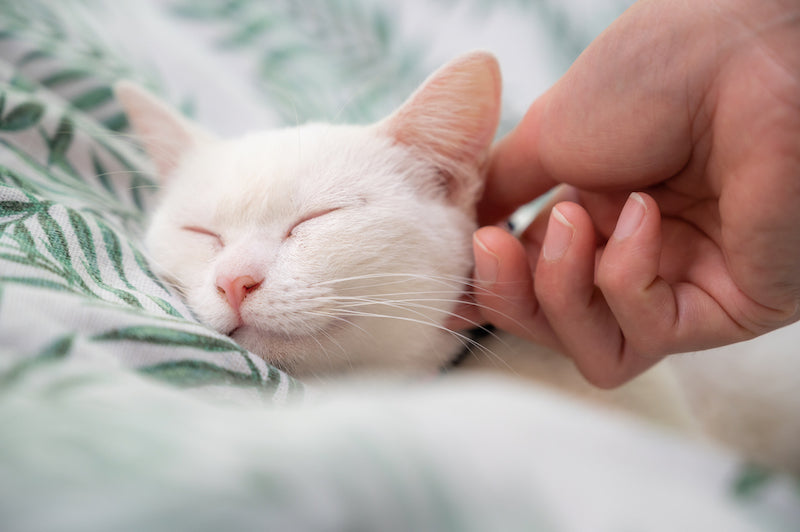
Do you have an itchy cat? It’s possible that they could be suffering from dermatitis—an increasingly common skin condition seen in cats. In this post, we review two types of this uncomfortable affliction: atopic dermatitis and food allergic dermatitis. The Basepaws citizen science program needs your help to better understand the genetic and oral microbiome factors associated with these conditions. Learn more about these dermatitis research programs and consider applying today!
Dermatitis and Allergies in Cats
Dermatitis is a general term for any type of skin inflammation, until a more specific diagnosis is made. Feline atopic dermatitis, also known as atopy or non-flea non-food allergic dermatitis, is considered the second most common allergy in cats after flea allergy dermatitis. Atopy is associated with the presence of immunoglobulin E (IgE), which are antibodies produced by the immune system’s B cells in response to an environmental allergen (or in other cases, an infection).
Food allergies are the third most common type of feline allergy. They are characterized by an abnormal response by the immune system to specific proteins within food, causing the immune system to produce antibodies. Food allergies can develop at any age, and it is still not fully understood why some cats develop food allergies while others do not.
Challenges to Diagnosing and Treating Dermatitis in Cats
Though their causes differ, the clinical signs of feline atopic dermatitis and food allergic dermatitis appear indistinguishable—making it difficult to accurately diagnose between these two conditions for more effective treatments that get cats the targeted relief that they need.

The most common clinical sign exhibited by cats with either of these two conditions is pruritus, which is the medical term for abnormal itchiness in pets. Cats affected by pruritus will frequently scratch and over-groom themselves, which can result in hair loss, scabbing, open sores, lesions, or a combination thereof. The extent of these symptoms can vary, and due to the itchy discomfort that afflicted cats experience, continued scratching can lead to secondary skin infections.
An estimated 10 percent to 15 percent of cats affected by food allergies and food allergic dermatitis, however, can also exhibit gastrointestinal signs, such as vomiting and diarrhea. These signs are non-specific and can be associated with a range of many other feline health conditions—further complicating the diagnostic and treatment process.
How Dermatitis is Diagnosed
To make a diagnosis of whether it is a food or an environmental allergen that is likely causing the dermatitis, a veterinarian will perform a thorough physical exam, evaluate clinical symptoms, and review a cat’s medical history. There are also a range of other possible non-atopic skin conditions that a veterinarian must also rule out, such as flea bite hypersensitivity.

To narrow the possibilities, a thorough diagnostic workup may include procedures such as allergy testing and/or skin scraping and cytology (examination of blood or tissue cells under a microscope).
To rule out flea bite sensitivity, administration of flea prevention for a minimum of eight weeks is often required. The most frequent method of distinguishing between feline atopy and food allergic dermatitis, however, is a diet elimination trial of 8 - 12 weeks. Depending on the extent and severity of the condition, some patients may even need multiple diet trials and possible restriction to indoor-only environments.
Creating an Easier Way to Diagnose Dermatitis
Currently, no single test exists that can reliably diagnose feline atopic dermatitis. This uncomfortable and painful condition affects 12.5% of all cats and 10-15% of all dogs.
Basepaws, however, carried out preliminary studies that demonstrate how the state of the feline oral microbiome can be a powerful indicator of atopic dermatitis and food allergic dermatitis. These findings align with results from recent studies of specific signals in different human oral microbiome profiles that could be associated with food allergies and atopic dermatitis.
We are now recruiting for follow-up studies that could inform the development of a new oral swab test that is easy to use, painless, and non-invasive for reliably distinguishing between feline atopic dermatitis and food allergic dermatitis. Such a test could facilitate a more timely clinical diagnosis, potentially alleviating the need for extended diagnostic trials so that cats can get the targeted treatment they need and experience improved quality of life much sooner.
The information gathered by a simple swab of a pet’s mouth allows Basepaws to take a detailed look at the interplay between host genetics and the oral microbiome, and how they can be used together for earlier detection of feline atopy, food allergic dermatitis, and other diseases.
Help Change the Future of Dermatitis Diagnosis in Cats
Join the Basepaws citizen science dermatitis research program—your participation could help change the future of feline atopy and food allergic dermatitis diagnosis and treatment in cats and improve the lives of cats suffering from these debilitating conditions. If you are a pet parent with a cat who has a veterinarian-confirmed diagnosis of atopic or food allergic dermatitis, please click on the applicable link(s) below to be considered for our research programs:
- Basepaws citizen science atopic dermatitis application link
- Basepaws citizen science food allergic dermatitis application link
If you are a pet parent of a qualifying cat in the U.S. (and not already a Basepaws customer) we will send you a free oral swab kit to collect your cat’s DNA sample. Shipping is also free and a prepaid return label is provided with your kit. Qualifying participants (and cats) who are not current Basepaws customers will also receive a free Basepaws cat DNA report as a thank you for helping us to advance new discoveries in feline health!
If you are a veterinary professional and would like to learn about incentives for joining our clinical research programs for both feline and canine atopic and food allergic dermatitis, please contact us directly at science@basepaws.com to participate.
Help Basepaws advance science for the wellbeing of all petkind by joining us in this important research effort! We are honored to collaborate with an amazing community of pet parents and veterinary professionals like you on groundbreaking studies that support the development of affordable and easy to use screening tools for the early recognition and treatment of pet diseases.


